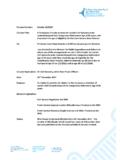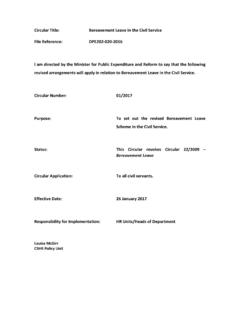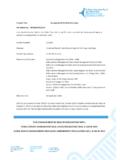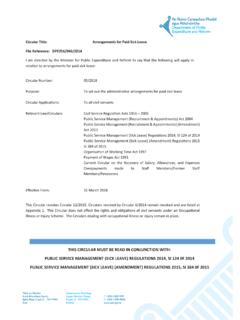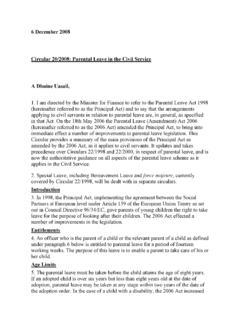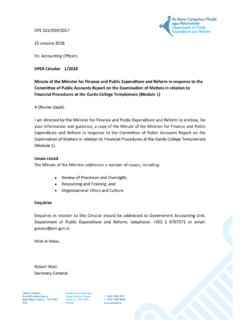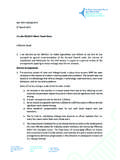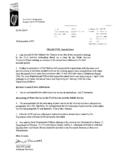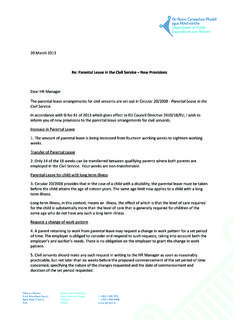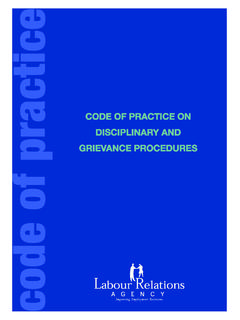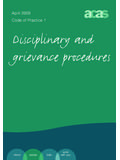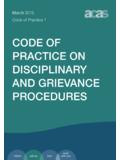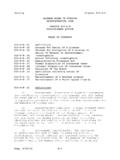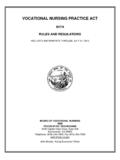Transcription of Circular Title: Ceivil Servic Disciplinary Code Feile …
1 Circular Title: Civil Service Disciplinary code File Reference: DPE200 006-2016 I am directed by the Minister for Public Expenditure and Reform to say that the following will apply in relation to arrangements for Disciplinary matters in the Civil Service: Circular Number: 19/2016 Purpose: To set out the arrangements for dealing with Disciplinary matters in the Civil Service Circular Application: To all civil servants (except new entrants serving in a probationary capacity) Relevant Law: Civil Service Regulation Acts 1956 2006 Public Service Management Act 1997 SI No.
2 146/2000 - Industrial Relations Act 1990 ( code of Practice on Grievance and Disciplinary Procedures) (Declaration) Order 2000 Effective From: 01 September 2016 This Circular revokes Circular 14/2006, Civil Service Disciplinary code revised in accordance with the Civil Service Regulation (Amendment) Act 2005. Louise McGirr Civil Service HR Policy Unit 15 August 2016 2 Contents: Part 1: Purpose and principles Part 2: The Disciplinary procedure and use of the code Part 3: The Disciplinary procedure Step 1 Commence the process Step 2 Investigation: establish the facts Step 3 Prepare for the Disciplinary meeting Step 4 The Disciplinary meeting Step 5 Outcome of the Disciplinary meeting Step 6 Decide the appropriate Disciplinary action Part 4: Disciplinary appeals Appendix A: Examples of misconduct and serious misconduct Appendix B.
3 Identity of persons to whom appeals may be made further to this code 3 Part 1: Purpose and principles Purpose The purpose of this code is to set out the arrangements for dealing with Disciplinary matters in the Civil Service. It is also to ensure that all civil servants are aware that if there is a failure to adhere to the required standards of conduct, work performance and attendance, the Disciplinary procedure set out in this Circular will apply. This procedure will be initiated where a concern arises about the conduct, work performance, and/or attendance of a civil servant.
4 This procedure will provide a fair and efficient process for dealing with any such concern. This code will apply to all civil servants other than new entrants serving in a probationary capacity. Principles The Civil Service is committed to providing efficient and well managed services. All civil servants shall comply with the code of Standards and Behaviour and all policies relating to terms and conditions of employment. In circumstances where a concern arises about the conduct or performance of an individual it may be necessary to take Disciplinary action.
5 Where such circumstances arise, all civil servants must be treated in a fair and equitable manner in accordance with the principles of natural justice which will normally include: The right of a civil servant to be informed of any concern about his or her conduct; The right of reply to any such concern; The right to be represented by a serving civil servant or by an official employed by a trade union holding recognition from the relevant Department or Office in respect of civil servants at that grade or rank; and The right to a fair and impartial determination of the matter after all relevant facts have been considered.
6 Line managers are responsible for making civil servants aware of the acceptable standards of attendance, work performance and conduct expected from them and for dealing with shortcomings promptly and fairly. In general the line manager will deal with any concern on an informal basis through discussion and appropriate assistance rather than through the formal Disciplinary procedure. 4 All civil servants must comply fully with any Disciplinary process. This obligation extends to any civil servants involved in a discplinary process as a witness, or in any other capacity.
7 A civil servant who fails to comply with a Disciplinary process without reasonable cause will be in breach of his/her terms of employment and will be subject to Disciplinary action. There is an obligation on all parties to comply with all the provisions of the Disciplinary procedure in accordance with law. 5 Part 2: The Disciplinary procedure and use of the code The Disciplinary procedure The Disciplinary procedure set out in this Civil Service Disciplinary code ( the code ) will be commenced where concern has arisen, or an allegation has been made, that misconduct may have occurred on the part of a civil servant.
8 Misconduct Misconduct encompasses any type of behaviour that breaches acceptable standards in the workplace. Misconduct also includes a failure to improve performance where a Performance Improvement Plan (PIP) has been in place but has not resulted in the required improvement. Any reference to misconduct in this Circular shall also be a reference to a failure to improve performance in accordance with a PIP and any reference to conduct shall include performance issues. Misconduct may also include inappropriate behaviour outside the workplace which has an impact, or could reasonably be likely to have an impact, within the workplace.
9 Examples of misconduct and serious misconduct are provided in Appendix A. Frustration of the Disciplinary procedure It is the duty of all civil servants to participate in the Disciplinary procedure when required to do so. Where a civil servant fails or refuses (without reasonable cause) to do so, then the relevant manager may make a decision in the absence of the civil servant s full participation. Where there is a repeated pattern of non-participation (without reasonable cause) the relevant manager should: continue with the Disciplinary procedure; advise the civil servant accordingly; and inform the civil servant of each step as it is reached.
10 The relevant manager should give the civil servant the opportunity to participate in subsequent steps of the procedure. The relevant manager may draw an adverse inference from the non-participation of a civil servant in any part of the Disciplinary procedure. 6 Relevant manager Any reference to relevant manager shall mean the line manager, a more senior manager or a HR Manager as appropriate to the specific situation. Each Department or Office may determine who the relevant manager is in respect of Disciplinary matters and may issue appropriate guidance on such matters.
